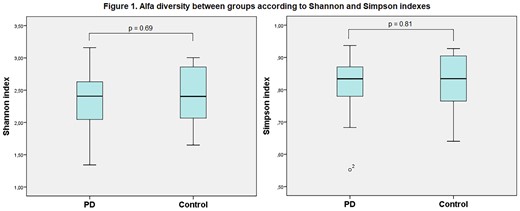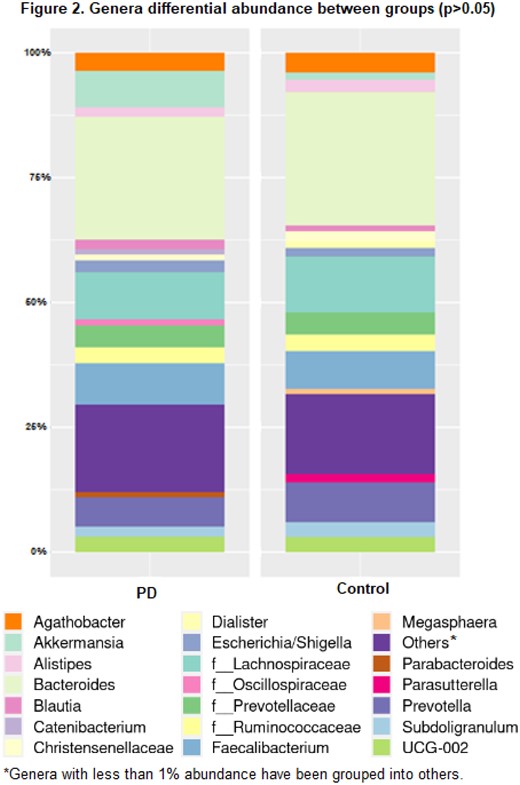-
PDF
- Split View
-
Views
-
Cite
Cite
Renata Rodrigues Teixeira, Laila S. Andrade, Natalia Barros Ferreira Pereira, Christian Hoffmann, Lilian Cuppari, MO598
COMPARISON OF GUT MICROBIOTA COMPOSITION BETWEEN PERITONEAL DIALYSIS PATIENTS AND HEALTHY HOUSEHOLD CONTACTS, Nephrology Dialysis Transplantation, Volume 36, Issue Supplement_1, May 2021, gfab089.0011, https://doi.org/10.1093/ndt/gfab089.0011Close - Share Icon Share
Abstract
According to some studies, it seems that advanced chronic kidney disease (CKD) has the potential to cause alterations in the composition of patients gut microbiota. Most of these data have been provided by comparing the microbiota profile between patients and healthy individuals. However, well-known factors that influence the microbiota composition such as age, environment and diet were not considered in the majority of these comparative studies. In the present study, we aimed to compare the gut microbiota composition between patients on peritoneal dialysis (PD) and age-paired healthy household contacts.
This is a cross-sectional study. Patients undergoing automated PD for at least 3 months, aged 18 to 75 years and clinically stable were enrolled. Those who were using prebiotics, probiotics, symbiotics and antibiotics within a period of 30 days before the study, were not included. A healthy control group was composed by individuals living in the same home and with similar age of the patients. Participants received sterile materials to collect the feces sample and were instructed to keep it refrigerated and bring to the clinic within a period of 12h. To evaluate the microbial profile, 16S ribosomal DNA was PCR-amplified and sequenced on an IlluminaMiSeq platform. Diet was evaluated using a 3-day food record and the diet quality was analyzed by a Brazilian Diet Quality Index. Rome IV questionnaire was applied to diagnose constipation. Nutritional status was assessed by 7-point subjective global assessment (SGA) and body mass index (BMI). Fasting blood samples were collected and clinical data were obtained from interviewing the participants and from the patient’s charts. Data are presented in percentage, mean ± standard deviation or median (interquartile range).
Twenty patients (PD group) and 20 healthy household contacts (control group) were studied. In PD group: 70% were men, 53.5 (48.2 - 66) years old, 50% had diabetes, BMI 25.9 ± 4.8 kg/m², 95% well-nourished, 40% constipated, 14 (5.2 – 43.5) months on dialysis and 80% had residual diuresis. In control group: 30% were men, 51.5 (46.2 - 59.7) years old, BMI 28.7 ± 3.5 kg/m² and 20% constipated. Except of sex (p = 0.01) and BMI (p = 0.04), there were no other differences between groups.
Comparing dietary intake between groups, no difference was found in daily energy [PD: 20.8 ± 5.4 kcal/kg/d vs. control: 22.0 ± 5.6 kcal/kg/d, p = 0.51], protein (PD: 0.8 ± 0.2 g/kg/d vs. control: 0.9 ± 0.2 g/kg/d, p = 0.23) and fiber [PD: 14.1 (10.7 – 21.1) g/d vs. 13.7 (10.4 – 18.0) g/d, p = 0.85]. In addition, the Diet Quality Index was also not different between groups (PD: 52.3 ± 15.6 vs. control: 54.5 ± 14.8, p = 0.65).
Regarding microbiota composition, no difference was found between groups in alfa diversity (Figure 1), beta diversity (p>0.05), and genera differential abundance (Figure 2).

Alfa diversity between groups according to Shannon and Simpson indexes

In the present study, no difference in the gut microbiota composition was found between patients on PD and healthy household contacts sharing a similar environment and diet. This result suggests that CKD and PD seem not to alter significantly gut microbiota composition.
- antibiotics
- polymerase chain reaction
- hemodialysis
- peritoneal dialysis
- body mass index procedure
- diabetes mellitus
- kidney failure, chronic
- diabetes mellitus, type 2
- calories
- constipation
- diet
- diuresis
- dna, ribosomal
- fasting
- food
- infant, small for gestational age
- probiotics
- rome
- dialysis procedure
- nutritional status
- subjective global assessment
- automated peritoneal dialysis
- prebiotics
- microbiome
- stool specimen





Comments